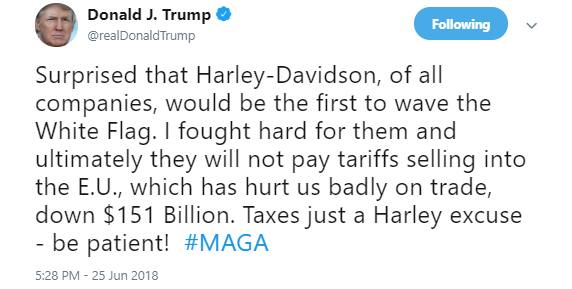harley-davidson executive warns of ‘devastating’ potential tariffs on motorcycles made in the usa

Amidst rising tensions over international trade, a Harley-Davidson executive has sounded the alarm on the potential repercussions of looming tariffs. The iconic American motorcycle manufacturer is facing the possibility of facing ‘devastating’ tariffs on its motorcycles produced in the USA. This development threatens not only Harley-Davidson’s robust legacy but also its global market standing. The warning underlines the challenges that could impact production, pricing, and ultimately, the brand’s loyal customer base.
An executive from Harley-Davidson has raised concerns about impending tariffs that could severely impact motorcycle production in the United States. This potential economic measure poses a threat to not only the iconic American brand but also to the broader motorcycle industry. The warnings highlight the possibility of increased costs that might be passed down to consumers, affecting both sales and the competitive standing of American-made motorcycles in the global market.
Understanding the Tariff Threat
The possibility of steep tariffs on motorcycles manufactured in the USA could have a profound impact on the industry. Harley-Davidson, a symbol of American manufacturing prowess, finds itself at the forefront of this brewing economic storm. The company’s executive believes these tariffs could lead to tremendous financial burdens, affecting production costs and ultimately the pricing strategy.
These tariffs are said to be in retaliation to broader trade disputes, posing challenges to motorcycle manufacturers who rely on exporting their products internationally. The industry, which thrives on global sales, could face significant setbacks if trade barriers increase, leading to complicated market dynamics. For companies like Harley-Davidson that have established a legacy of quality and tradition, the stakes are undeniably high.
The Potential Economic Impact
Introducing tariffs on domestically produced motorcycles would unquestionably raise production costs for manufacturers. As a result, the end prices for consumers may surge, which could be detrimental to sales volumes. Given that motorcycles often represent a luxury or lifestyle choice more than a necessity, increased prices could discourage prospective buyers.
Harley-Davidson’s executive warns that the worse outcome of these tariffs could be a loss of competitiveness in the international market. Rivals outside the U.S., not subjected to the same trade constraints, would potentially capitalize on the situation, widening the gap in pricing and market share. This scenario not only risks financial implications but endangers the brand’s global standing as well.
A Historic Brand Facing Modern Challenges
As an emblem of freedom and exploration, Harley-Davidson has long represented the adventurous spirit of motorcycling. The company’s executive emphasizes that these potential tariffs threaten to undermine the very foundation upon which the brand has been built. Facing increased operational costs, Harley-Davidson may find it challenging to maintain its traditional manufacturing processes while keeping prices competitive.
Furthermore, the executive highlights potential job losses as another devastating consequence of these tariffs. The American workforce, so intricately connected to the motorcycle industry, could face job insecurity, disrupting communities reliant on Harley-Davidson’s manufacturing presence. For a brand that prides itself on its all-American identity, the threats posed by tariffs present an existential challenge.
Navigating the Road Ahead
In light of these challenges, Harley-Davidson is likely to explore strategic options to mitigate the effects of tariffs. This may include expanding production overseas—a move that could align with cost-saving measures but at the cost of moving jobs away from American soil. Additionally, innovations in manufacturing processes and materials could present opportunities to curb costs without sacrificing quality.
The company’s executive stresses the importance of advocating for fair trade policies that protect American manufacturing interests while fostering healthy competition. By highlighting the potential consequences of tariffs on U.S. motorcycles, Harley-Davidson hopes to rally support from industry stakeholders and policymakers towards achieving a sustainable economic environment for the future of American motorcycle manufacturing.
In recent developments, a senior executive at Harley-Davidson has sounded the alarm over the “devastating” impact that potential tariffs could have on motorcycles manufactured in the USA. These tariffs pose a significant threat to not only the iconic brand but also the broader motorcycle industry. In this article, we’ll dive into the potential consequences, explore solutions, and provide insights into how bikers and enthusiasts can prepare for these changes.
Understanding the Tariff Threat
The current trade climate has raised the possibility of introducing tariffs on American-made goods, including motorcycles. For a brand like Harley-Davidson, which has been a symbol of freedom and adventure for decades, such tariffs could result in increased prices, thereby reducing competitiveness in the global market.
Impact on Harley-Davidson
Harley-Davidson, a company with a rich heritage and a loyal fan base, could face severe economic challenges if tariffs are implemented. Higher costs could be passed onto consumers, leading to decreased sales and potentially affecting jobs within the company’s manufacturing plants in the USA. For a brand that prides itself on crafting motorcycles domestically, this is a significant concern.
Wider Industry Implications
It’s not just Harley-Davidson that stands to be affected. The entire American motorcycle industry, including suppliers and small businesses tied to manufacturing and distribution, faces uncertainty. The ripple effect could lead to a slowdown of innovation and investment in the sector, impacting sales and market growth.
How Bikers Can Prepare
For motorcycle enthusiasts and future buyers, being aware of these potential changes is crucial. Consider the current price and availability of motorcycles. If you have been thinking about purchasing a Harley, now might be an opportune time before any price hikes occur.
Additionally, staying informed about any changes and updates from official sources will help bikers make educated decisions moving forward. Joining forums and communities where enthusiasts share news and tips is another great way to stay in the loop.
Exploring Solutions
The focus now is on fostering dialogue between companies and policymakers to find solutions that avoid or mitigate the impact of these tariffs. By engaging in constructive discussions, it’s possible to reach agreements that benefit both the industry and the broader economy.
Efforts are also being made to explore alternative markets and diversify manufacturing bases to reduce the dependency on any single trade agreement. This strategy could provide flexibility and resilience in the face of changing trade policies.





